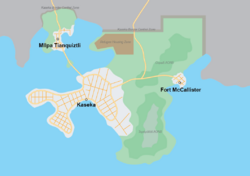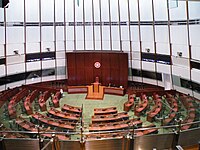Kaseka
Governorship of Kaseka Governorship of Kaseka | |
|---|---|
|
Flag | |
| Motto: "In virtute maris" | |
 | |
| Status | Autonomous Territory of Seylos |
| Capital and largest city | Kaseka |
| Official languages | Anglish |
| Recognized languages | Ka |
| Religion | Seylosian Protestantism (No official religion) |
| Demonym(s) | Kasekan |
| Government | Democratic Governorship |
• Governor | Mahuizoh Maclver |
| Legislature | Kasekan Council |
| Establishment | |
• Purchase from Kingdom of Khao | 1864 |
| Area | |
• Total | 552 km2 (213 sq mi) |
| Population | |
• 2021 census | 232,054 |
| GDP (nominal) | estimate |
• Total | $12.5 billion |
• Per capita | $54,256 |
| HDI (2021) | .90 very high |
| Currency | Seylosian Pound (KSP) |
| Time zone | UTC -6 |
| Driving side | right |
| Calling code | +99 |
| Internet TLD | .se |
The Governorship of Kaseka, commonly known as Kaseka, is a Seylosian autonomous territory located in Aurelia. The territory is landbordered on all sides by Great Xio. To the south lies the Gulf of Auriel. The area of what is now Kaseka was originally purchased in 1864 from the Kingdom of Khao. Relatively quickly, the territory grew from a small town of two thousand former slaves to a bustling city of hundred of thousands. Laws are passed by the Kasekan Council. The Governor is Mahuizoh Maclver. It has become an important hub of trade in the Gulf of Auriel, and represents Seylosian influence in the region. In 2021, it joined the North Adlantic Union.
History
Kaseka's history traces back to 1864 when it was purchased from the Kingdom of Khao. Initially a small town inhabited by about two thousand former slaves, it grew over time into a bustling city that now has a population of hundreds of thousands. This rapid growth can be attributed to its strategic location, which positioned it as an important hub of trade in the Gulf of Auriel and allowed it to represent Seylosian influence in the region. In 2021, Kaseka joined the North Adlantic Union, further bolstering its geopolitical significance.
Politics
The political structure of the Governorship of Kaseka is defined by a unique democratic governorship system. The helm of its administrative machinery is held by a governor who functions as the highest executive authority within the territory. The current governor, as of the present date, is Mahuizoh Maclver, who has been entrusted with the task of ensuring the smooth functioning of the territory's executive branches, as well as representing Kaseka in its relations with the parent nation, Seylos, and other external entities.

The process of lawmaking in Kaseka is vested in the Kasekan Council. This council is composed of representatives elected by the citizens of Kaseka, and it operates under the principles of representative democracy. The Kasekan Council holds the responsibility of debating, formulating, and enacting the laws that govern the territory. Each law is meticulously discussed to ensure that it aligns with the territory's values and contributes to the well-being of its residents. The enacted laws cover a wide range of issues, from economic policies and social services to environmental regulations and infrastructure development.
Despite being an autonomous territory, Kaseka operates under the aegis of Seylos. This arrangement means that while Kaseka exercises a significant degree of self-governance, it also maintains a strong connection with its parent nation. This relationship balances the territory's local autonomy with the broader obligations and benefits that come with being part of a larger national entity. Seylos provides Kaseka with diplomatic, military, and economic support, while Kaseka adheres to Seylos's constitutional principles and contributes to the nation's overall economic and cultural fabric.
Kaseka's self-governance manifests in various aspects of its administration. For instance, it has the power to administer local resources, implement and manage local public services, and govern its internal affairs to a large extent. The territory's policies on education, healthcare, and local infrastructure are decided and implemented at a local level, in line with the unique needs and aspirations of its population.
However, it is crucial to note that while Kaseka enjoys autonomy, it is not entirely independent. Its foreign policy and defense are generally overseen by Seylos, and it is obligated to follow certain national laws and policies. The Seylosian government also has the right to intervene in Kasekan matters if it deems necessary, particularly in situations that might impact national security or violate the constitutional principles of Seylos.
In this delicate balance of autonomy and obligation, the democratic governorship of Kaseka carves out a distinct political identity. The territory's governance model reflects its unique history and context, while also echoing the broader democratic principles of its parent nation, Seylos. It is a testament to the potential of political systems to adapt and innovate in response to specific local needs and geopolitical realities.
Economy
As of the latest estimate, the nominal Gross Domestic Product (GDP) of Kaseka stands at $12.5 billion, with a per capita income of $54,256. The territory's economy is primarily driven by trade due to its strategic location near the Gulf of Auriel. The Human Development Index (HDI) for the year 2021 was reported to be 0.90, signifying a very high level of human development.
Kaseka follows the UTC -6 time zone. Its infrastructure is modern, with residents driving on the right-hand side of the road. The territory has its own calling code, +99, and uses the Internet top-level domain (TLD) .se. The official currency is the Seylosian Pound (KSP). Kaseka's infrastructure supports its bustling economy and ensures a high quality of life for its residents.
The Governorship of Kaseka, with its rich history and strategic location, remains a vital point of trade and cultural exchange in the region, and it continues to be a symbol of Seylosian influence in Aurelia.
Demographics
The official language of Kaseka is Anglish, and a recognized minority language is Ka. While there is no official religion, Seylosian Protestantism is the predominant faith practiced in the region. Kasekans, as the inhabitants of this territory are known, are renowned for their cultural diversity and rich traditions, reflecting their history and a blend of different influences.
